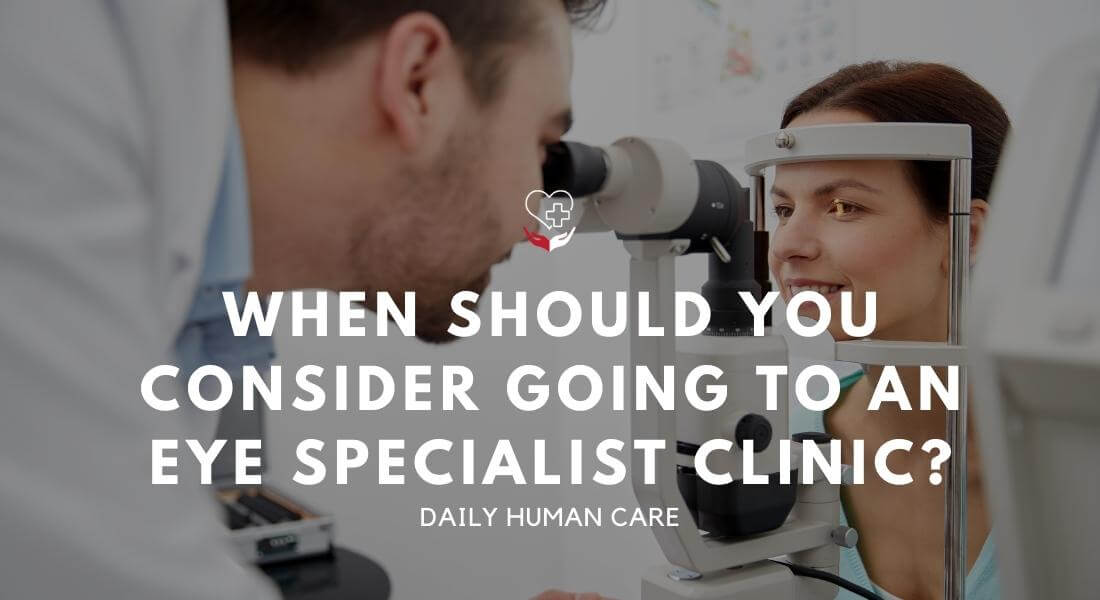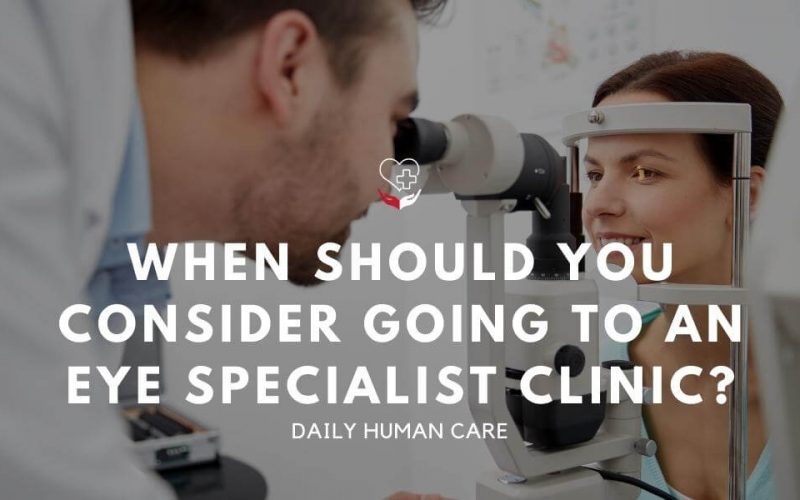In this Article Daily Human Care is going to discuss When should you Consider going to an Eye Specialist Clinic?
An eye specialist clinic is a specific type of medical practice that specializes in the care and treatment of eye-related issues. Most clinics will offer diagnosis and treatment for common vision conditions such as cataracts, glaucoma, macular degeneration, etc.
Visiting an ophthalmologist can help you protect your eyesight as well as your overall health since many diseases such as diabetes and high blood pressure also affect the function of the eyes. There are several instances when your doctor recommends that you should go to an eye specialist clinic, including:
- When you see flashes of lights, halos or other visual disturbances that may be a sign of glaucoma. Glaucoma is an eye condition that damages the optic nerve and, if not checked in time, can result in blindness.
- When you feel like there is something stuck in your eye and it’s hard for you to remove it yourself. You should go to an eye specialist clinic as soon as possible to ensure that you do not cause any damage to your eyes.
- If you need a vision test or check-up because your vision seems blurry or not as clear as usual. Even though such symptoms don’t pose an immediate danger, they could be a sign of serious problems such as cataracts or macular degeneration, which may lead to loss of sight if left undiagnosed and untreated for quite some time.
- When you wake up with red eyes with a lot of discharge. This could be due to an allergy such as hay fever, and it is best if you go to your eye specialist clinic as soon as possible so that you will not be left with difficult-to-remove crusts around the eyes.
- When your child seems to squint or close one of his eyes most of the time. Most likely, there is something wrong with his vision, and he needs a vision test which can only be done by visiting an eye specialist clinic. If you suspect that your child has poor sight, do not hesitate to bring them to the clinic for a check-up immediately.
Table of Contents
What to Expect when Visiting an Eye Specialist Clinic?
When you visit an eye specialist clinic, the first thing that you should expect is to have your eyes thoroughly examined by the doctor. They will then prescribe appropriate medication or treatment based on your condition.
With eye specialists who are also ophthalmologists, they have the skills and knowledge to perform various procedures for diagnosis and treatment of different types of vision conditions. Some examples include LASIK surgery, lens replacement surgery, among others.
Do note that there are several types of eye specialists, but only three are relevant in diagnosing and treating visual problems, including optometrists, ophthalmologists and vitreoretinal specialist surgeons.
- Optometrist:This type of doctor specializes in assessing and treating common vision problems such as near-sightedness, farsightedness, and astigmatism. They can also provide prescriptions for glasses or contact lenses which opticians will then follow up on to ensure that you get exactly what you need.
- Ophthalmologist: TThis type of eye specialist has a medical degree in ophthalmology which means they have been trained extensively in studying the structure and function of the eye as well as diagnosing and treating different types of visual conditions. They are trained to perform surgeries to correct various sight problems depending on their specialty. Some examples include laser surgery for the correction of near-sightedness, among others.
- Vitreoretinal surgeon:These doctors specialize in treating complicated conditions affecting the retina, vitreous and other areas in the back of the eye. They perform surgeries to correct defective vision caused by retinal problems, including cataracts.
Also Read : Everything about Dysphagia | Causes, Symptoms, Diagnosis, Treatments and Dysphagia ICD 10 codes

How to find the best Eye Specialist Clinic for you?
When looking for an eye specialist clinic, be sure to ask your primary care physician or optometrist for referrals if they cannot provide it themselves. Ask around from friends and relatives who have gone through similar conditions as yourself to check if they can recommend specific clinics that will suit their needs.
For reputable institutions, you can go online, where several recommendations are available. You should also keep track of upcoming medical seminars, which might offer free screenings wherein attendees can receive consultations with different specialists without having to pay any fees.
Questions to ask your Eye Specialist before your Appointment
Before you even get to the doctor’s clinic, be sure to have a list of questions ready so that you will have an idea of what to do next. Some of these questions include:
- How long will it take for me to recover? You should find out if any follow-up appointments are required after the main procedure. If there are no complications with your condition, all you might need are some eye drops prescribed by the doctor. If something more serious is involved, expect that follow-up visits every month or two may be required until full recovery is made.
- Is my case critical? Your doctor should be able to give you a straight answer regarding whether your condition is life-threatening or not. If it is, then life-saving treatment should be immediately done. The doctor might also perform a complete examination to determine the extent of the damages caused by your condition.
- How much will the procedure cost? There might be instances wherein you need to pay more than usual because of complicated treatments or surgeries. However, most health institutions offer discounts and promos for cash-paying patients, so it is best to ask about this before you make a commitment with your doctor.
Aftercare Following an Eye Specialist Appointment
After being diagnosed with your condition, you will receive proper treatment from the doctor, depending on what they have observed during your consultation. Once you are cleared for surgery, all left is to wait until everything is scheduled and prepared.
On your scheduled date, follow every instruction carefully as failure to do so might result in complications or serious side effects which can affect your overall health. For example, there are certain medications that cannot be taken before undergoing surgeries, such as LASIK as well as what to do, among others, to avoid adverse effects like infections.
The Bottom Line
Since every individual possesses unique characteristics, it is important that you find the right doctor to address your specific needs. It is about finding the cheapest cost for surgery and finding a clinic where personalized treatment can be given based on your current condition and overall health status.
Also, read lasik surgery in dubai





